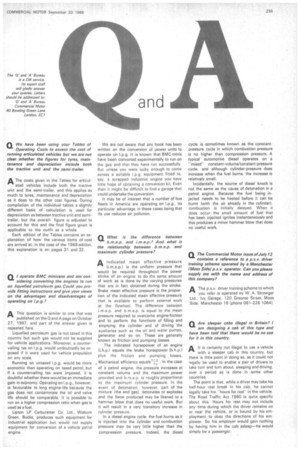/ operate BMC minivans and am con
Page 259

If you've noticed an error in this article please click here to report it so we can fix it.
sidering converting the engines to run on liquefied petroleum gas. Could you provide fitting instructions and give your views on the advantages and disadvantages of operating on I.p.g.?
AThis question is similar to one that was published on the Q and A page on October 27, 1967. and part of the answer given is repeated here
Liquefied petroleum gas is not taxed in this country but such gas would not be supplied for vehicle applications. Moreover, a countervailing tax on I.p.g. would undoubtedly be imposed if it were used for vehicle propulsion on any scale Running on untaxed I.p.g, would be more economic than operating on taxed petrol, but if a countervailing tax were imposed, it is doubtful whether there would be an immediate gain in economy. Operating on I.p.g., however, is favourable to long engine-life because the gas does not contaminate the oil and valve life should be comparable. It is possible to run on a higher compression ratio when gas is used as a fuel.
Lipton LP Carburetter Co. Ltd., Woburn Green. Bucks, produces such equipment for industrial application but would not supply equipment for conversion of a vehicle petrol engine. We are not aware that any book has been written on the conversion of power units to operate on i.p.g. It is known that BMC minis have been converted experimentally to run on the gas and that they have run successfully. But unless you were lucky enough to come across a suitable pg. equipment fitted to, say, a scrapped industrial engine you have little hope of obtaining a conversion kit. Even then it might be difficult to find a garage that could undertake the conversion.
It may be of interest that a number of bus fleets in America are operating on I.p.g., its particular advantage in these cases being that its use reduces air pollution.


















































































































































































































































































































































































